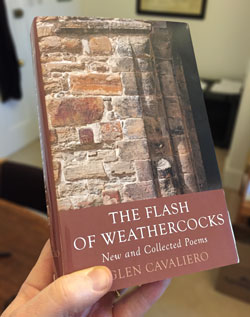Poetry is language at its most distilled and most powerful. — Rita Dove
A good friend of ours, Glen Cavaliero, is a poet. An exceedingly good one, in fact, and highly-regarded among the cognoscenti. Over the decades, in addition to his academic books, he has published numerous slim poetry volumes but, now approaching his ninetieth birthday, he wanted to gather them into a more substantial collection; not quite a ‘complete works’, but something of that ilk.
Glen, however, owns no technology more advanced than a typewriter, and so one of our side-projects over the last couple of years has been to help him with the process of self-publishing this 500-page masterpiece, which finally saw the light of day towards the end of 2016.
 If you or any of your friends are seriously interested in good poetry, I recommend The Flash of Weathercocks. Some of the poems are dark and gritty, some light and cheery, some funny, some melancholy, some deeply thoughtful, some highly accessible, others filled with subtle literary allusions. Very few of them are easy reading. But all of them are expertly crafted by a master of the language.
If you or any of your friends are seriously interested in good poetry, I recommend The Flash of Weathercocks. Some of the poems are dark and gritty, some light and cheery, some funny, some melancholy, some deeply thoughtful, some highly accessible, others filled with subtle literary allusions. Very few of them are easy reading. But all of them are expertly crafted by a master of the language.
You can find it in:
Now, I’ve learned a few things in this process. One is that poetry is much harder to typeset than prose: even trying to ensure that page-breaks come in sensible places in the middle of verses was quite a challenge for the publisher, but to add to this, for many of Glen’s pieces, the careful indentation of each line is important…
The other revelation for me was a clearer understanding of the effect Amazon has on the publishing world, especially the self-publishing world. I’m a huge fan of Amazon in general, but the margin they take on books is pretty severe! In our case, the publisher charges 15%, so when people buy from the publisher’s site, the author gets 85% of the cover price to offset against his or her up-front printing costs. That is all very reasonable.
Amazon, however, charges a further 60%, so the author gets 25%. Or, to put it another way, once you’ve established the printing costs, you need to set your cover price to four times that amount if you are just to break even on Amazon sales. Since poetry, by its very nature, tends to involve small print runs with a high per-unit cost, this would make the cover price prohibitive for Glen’s book. And so, in fact, we had to pick a cover price where he will lose money on every sale through Amazon, and make money if people buy from the publisher or directly from him.
I created a spreadsheet where we could estimate, for various values of X, that X times as many people are likely to buy from Amazon as from elsewhere, and settled on a price where he should just about break even overall. Our job now is to publicise the non-Amazon links as much as possible!
Above all, it’s clear to me that, even if you have tributes from the likes of Sir John Betjeman on your back cover, poetry is definitely something you create for love, rather than for money!
But I do think this is a significant work of literature, and since there’s no way I’m ever going to produce one of those myself, I’m delighted to have been at least instrumental in helping it come into existence!